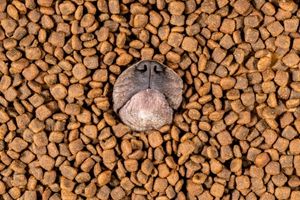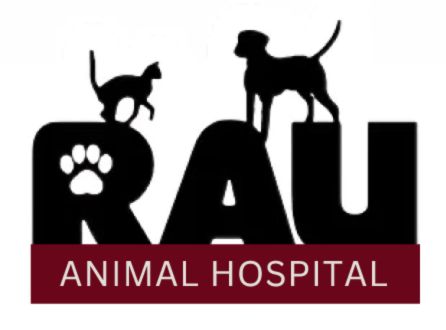From choosing the right food to making sure you’re not offering up too many treats, you need to keep several things in mind when it comes to meeting your dog’s nutritional needs. To make things even more complicated, much of what you think you know about canine nutrition could be completely wrong. There are a lot of dog nutrition myths out there, and following inaccurate information could put your four-legged best friend’s health at risk.
As your dog’s veterinarian, we are here to help you provide the best nutrition possible. If you’re unsure what, how much, or how often to feed them, we encourage you to schedule an appointment with us so that we can get your dog’s diet on track. We also decided to debunk a few of the most common myths to separate facts from fiction. Read on to learn the truth about your canine companion’s nutritional needs.
1. Myth: Dogs Only Eat Meat
Your dog might enjoy an all-meat diet, but such a diet doesn’t provide adequate nutrition. Dogs are omnivores, not carnivores, and they need a mix of proteins, fats, and carbohydrates as part of their daily diet. In addition to meat, your canine companion needs starches, vegetables, and fruits. If you exclusively feed your dog meat, they could experience calcium, Vitamin A, and Vitamin D deficiencies.
Despite the growing trend of grain-free diets, most dogs can and should eat grains. Unless your dog is allergic or has another health issue that prevents them from eating grains, there is no reason to put them on a grain-free diet. In fact, doing so could lead to heart problems for your dog.
2. Myth: Raw Diets Are Better than Kibble
Dogs descended from wolves, so it only makes sense to feed them a raw diet, right?
Wrong. As domesticated dogs evolved from living in the wild to sharing their humans’ homes and beds, their digestive systems changed. Modern dogs are entirely different from their wild ancestors, and research has shown absolutely no benefit to feeding them a raw diet. Conversely, multiple studies have shown that feeding pets raw or undercooked food poses health risks to both animals and humans. Keeping your dog on a well-balanced, nutritionally complete pet food is safer and healthier than feeding them a raw diet.
3. Myth: By-Products Are Bad
Seeing the word “by-product” on a pet food nutritional label isn’t a red flag. By-products are simply parts of an animal that we, as humans, do not eat. They are perfectly healthy for dogs, though! By-products include organs, cartilage, and other tissues that manufacturers usually discard. Many pet parents mistakenly think of them as cheap filler, but they add nutritional value. Using by-products in dog food is good for the environment, eliminating unnecessary waste.

4. Myth: Any Kibble Sold in Stores Is a Safe, Nutritionally Sound Option
Kibble is a very healthy option for your canine companion — as long as you choose the right product. Most dog food kibble looks roughly the same, but not all pet food products are created equal. When shopping, look for food that meets the standards set forth by the Association of American Feed Control Officials (AAFCO). An AAFCO label indicates that a particular food meets minimum nutritional standards. It also shows which life stage the product is appropriate for.
Keep in mind, though, that meeting minimum standards doesn’t necessarily mean that a specific brand or formulation of kibble is suitable for your dog. Looking for AAFCO labeling is just a jumping-off point. You also need to consider whether a product meets your pet’s unique needs. Products from brands like Hill’s Science Diet, Purina Pro Plan, and Royal Canin are your best bet because these companies have veterinary nutritionists who oversee production. But, of course, your dog’s veterinarian is your best source of information regarding the best commercial pet food for your canine companion.
5. Myth: Veterinarians Recommend Certain Diets Because They Receive Kickbacks from Pet Food Companies
If we recommend a specific diet or prescription food for your dog, it’s because we believe it is the best product for meeting their nutritional needs — not because we stand to make a lot of money if you buy the food we recommend. Our financial gain from the sale of pet food is negligible.
In general, we recommend diets from the following companies:
- Hill’s Pet Nutrition
- Purina
- Royal Canin
We recommend these companies because they have been scientifically proven to be safe and well-balanced and come in a wide range of special formulas for specific diseases. When we suggest something for your pet, it’s always for their benefit, not our own. And, again, we're happy to help make recommendations for your canine companion that best suits their needs and lifestyle.
Final Food For Thought!
As a loving and responsible pet parent, feeding your dog a high-quality diet should be one of your primary concerns. Unfortunately, there is a lot of misinformation about what constitutes a healthy diet. If you need help better understanding your canine companion’s nutritional needs to provide them optimal wellness, we are here for you. Give us a call today to schedule an appointment.

